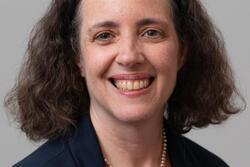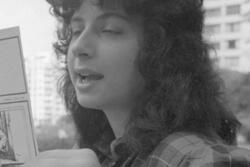More Than Just The Celebration of One Woman: Rabbi Cantor Angela Warnick Buchdahl
Usually, I’m a bit of a skeptic about the transformative power of women’s leadership. I don’t believe a woman in a position of power will necessarily create meaningful social change. I’m a little weary of celebrating “firsts” for women. I’m impatient and demanding and all the things feminists need to be if we’re going to change the world for more than an elite few.
And then there are moments when I feel the momentum rumbling beneath my feet and cynicism is nowhere to be found. Today I had one of those moments when I heard that Rabbi Cantor Angela Warnick Buchdahl has been chosen as the next Senior Rabbi at Central Synagogue, a prominent and powerful Reform congregation in New York City.
It wasn’t a huge surprise: Angela has been the beloved Senior Cantor at Central Syngagogue for several years, and has built a reputation as an up-and-coming national voice for the Reform Movement. She’s talented, warm, creative, bright, graceful, and confident. She’s also an old hand at blazing trails, as the first Asian-American to be ordained as a rabbi, and the first woman to be both a rabbi and a cantor.
Her selection is already being heralded as a significant milestone in American Jewish leadership, and rightly so. For a woman of color to be at the helm of a major Jewish institution speaks volumes about the new reality of the American Jewish community; it not only forecasts a different future for American Jews, it actually works to make that future possible. A generation of young Jews who look like Angela, or who otherwise feel different from their community’s norm in some way, will grow up with a totally different experience of their place in the Jewish community than Angela could have imagined during her own childhood.
This in itself is moving, but as an old friend and former roommate of Angela’s, my wholehearted enjoyment of this moment is also more personal. Of course, it’s thrilling to see “one of our own” get the recognition she deserves, especially when one can recall the moments of uncertainty and difficult decisions in the long journey to this moment. And in this celebration of Angela, I also hear a call to our generation, an announcement that our time has come to step into our own power and take responsibility for leading our communities into the next era.
Wearing the double lenses of friend and historian, I’m enjoying a perspective on this moment as more than just the celebration of one woman and one community’s “first.” I have a clear memory of learning Debbie Friedman’s “Miriam’s Song” from Angela about 20 years ago – a song I’ve had the pleasure of hearing her lead many times since then, rousing crowds of all ages from their seats to dance with unselfconscious joy. Without Debbie Friedman, there could have been no Angela. She takes her place as part of a larger narrative of Jewish women’s innovation and leadership through music and ritual and rabbinic presence. It’s a narrative that the Jewish Women’s Archive explores, documents, and preserves – particularly in its online exhibit Jewish Women and the Feminist Revolution and in its new partnership with the Story Archive of Women Rabbis – and continues to chronicle as it unfolds. Because somewhere out there right now, there’s a young person who will one day say, “Without Rabbi Angela Buchdahl, I couldn’t have become the leader that I am.” I can’t wait to hear that story, too.








Judith, just wanted to let you know that I used your blogpost AND the clip of "Somewhere Over the Rainbow" in my Jewish Women in Modern America class today. 16 junior girls sat mesmerized. I introduced the lesson on two notes: the first is the "ayn navi b'iro" notion that prevents many, and women in particular, from advancement within an organization. The second theme was one of re-visioning an idea which, to uninspired eyes (or in this case, ears), seems deadeningly familiar, with little potential for a new interpretation. I described my own sense of surprise and wonder at hearing Rabbi/Cantor Buchdahl's gloss to the song which then I heard again, but for the first time. Thanks for the wonderful intro your words provided, giving context and connection for the voice that followed. It was one of those lessons--and songs, newly relevant, I think some will remember long after they've forgotten the rest.
I'm a white male Christian clergyman who, to receive spiritual nourishment to enable me to minister to my (diverse) congregation, worships with Central Synagogue through its livestreaming services to "recharge my spiritual batteries". I have received so much spiritual strength from Rabbi/Cantor Buchdahl -- I look forward to continuing to be strengthened by her many gifts. Kol ha-Kavod!
Beautiful piece, and mazel tov (to her, and to us all) for this inspiring woman's accomplishment!